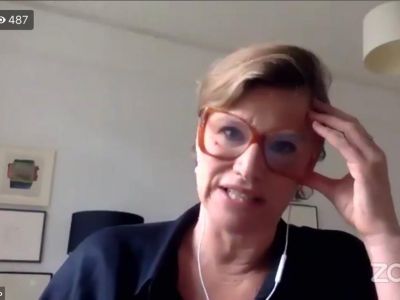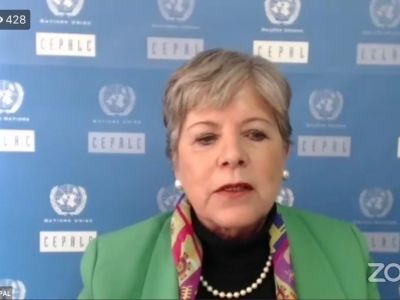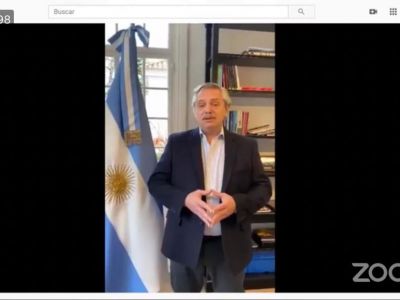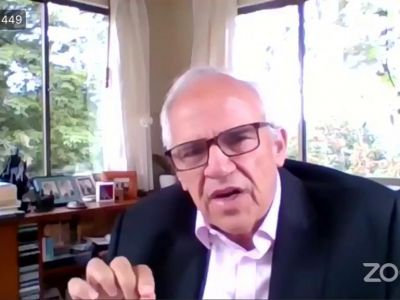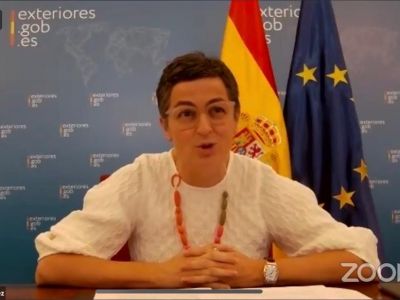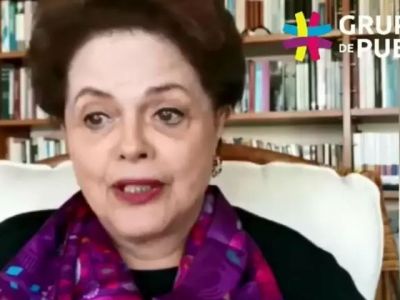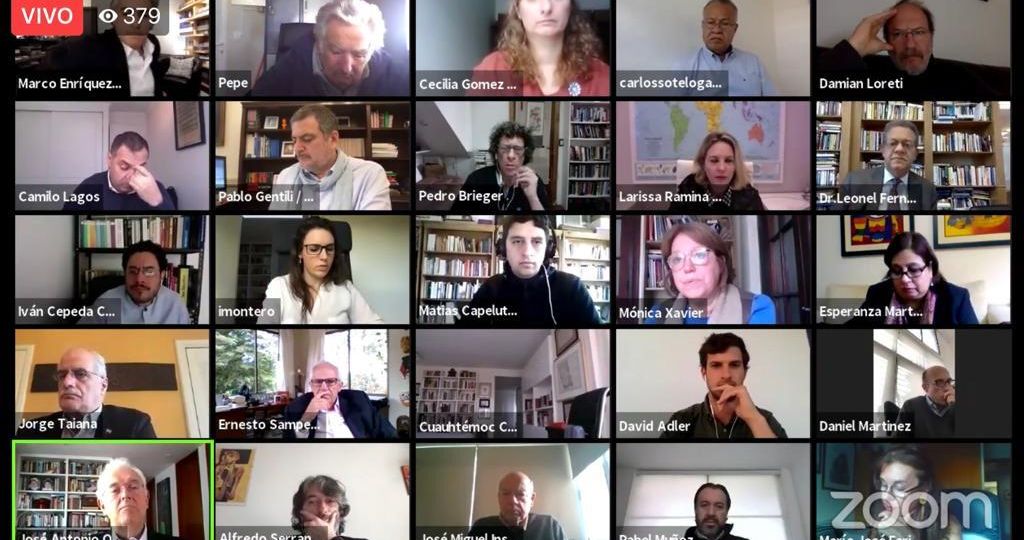
80 progressive leaders from 17 countries participated in the commemoration of the first year of existence of the Grupo de Puebla. The group has continued to grow and this is shown through the presence of representatives from three current governments in Latin America and the Caribbean (Argentina, Mexico and Spain), eight former presidents and several parliamentaries and progressive prominent names who gathered this Friday, July 10, to discuss the “Progressive agenda to overcome the pandemic Covid-19 crisis”.
Some of the people who joined a meeting of the group for the first time were the Foreign Affairs Minister of Spain María Aránzazu González,and the Chief of Government of Mexico City, Claudia Sheinbaum, who is the first woman elected for the position and who is also a close collaborator to the Mexican President Andrés Manuel López Obrador. Some people who wanted to be part of the meeting were not able to attend due to their full schedules were the President of the Spanish Government, Pedro Sánchez; the mayor of Barcelona, Ada Colau; Congresswoman from the United States, Ilhan Omar and former President Luiz Inácio Lula da Silva (Brazil).
The debate was moderated by the Executive Secretary of the Economic Commission for Latin America and the Caribbean (ECLAC), Alicia Bárcena and former presidential candidate from Chile, Marco Enríquez-Ominami, who is one of the coordinators and also one of the promoters of this initiative. In the meantime, former President of Colombia, Ernesto Samper and former Minister of Education from Brazil, Aloizio Mecadante, were in charge of presenting the details of the proposal that the Grupo de Puebla made to overcome the crisis brought by the Coronavirus pandemic.
Other attendees to the meeting were the Minister of Equalityof Spain, Irene Montero, the Minister of Women, Gender and Diversity of Argentina, Elizabeth Gómez Alcorta and, from the same country, ministers, Felipe Solá, from Foreign Affairs and International Commerce; the Minister of Education, Nicolás Trotta and the Minister of the Environment and Sustainable Development, Juan Cabandié. They were joined by the economists Mariana Mazzucato, who is not only a reputable academica, but also the advisor to the Italian Prime Minister, Giuseppe Conte, to overcome the Covid-19 crisis; and José Antonio Ocampo, who is internationally known for his work with Thomas Piketty and the 2001 Economy Nobel Laureate, Joseph Stiglitz. David Adler (United States), General Coordinator of the Progressive International and the Bolivian presidential candidate of the MAS, Luis Arce, were also present.
The debate put on the table topics such as the recovery of the fundamental role of the State on societies; public health as a global public good; a democratic fiscal rule to correct inequality; the development of a new democratic model for social inclusion; the strengthening of democracy and the need for transparency in decision-making; the correction of market flaws; promoting and protecting competition; the macroeconomic stability with active policies to create jobs and the re industrialization of countries and their economic transition.
The Grupo de Puebla also stated its rejection to the judiciary procedures with political motives against former presidents Evo Morales, Rafael Correa and Luiz Inácio Lula da Silva.
At the beginning of the commemoration, the President of Argentina, Alberto Fernández, commented through a video on one of the main objectives for the Grupo de Puebla: “To build a more equal continent, with more social balance, that better distributes income. Those are our pending issues. As long as poverty continues to exist in our countries, it is a moral debt that we have with each poor person, because we get into politics so that they can overcome poverty, so that they become integral members of the society where we want to live”.
Regarding the proposals of the “Progressive Agenda to overcome the crisis of the Covid-19 pandemic”, former President José “Pepe” Mujica pointed out: “I agree with the proposals about Fiscal matters, but we must start thinking about the investor State, not necessarily as a manager, but as a partner in new economic activities, especially if they are sustainable. It should not be possible for it there to be gigantic private groups in the world that are dedicated purely and exclusively to investment and that the States only resources are the ones from the fiscal policy. This should not be this way because each time they will need more and more resources and the market will have problems that it can never and should not solve. The market has no empathy nor mercy, that must be the function of the State”.
Former President of Brazil, Dilma Rousseff talked about the importance of building regional links in order to compete with big regional groups and boost the Latin American economy after the Covid-19 crisis: “We must build a regional space, we need to create regional chains of value in the continent. We have 670 million builders and that is our competitive advantage, we need to negotiate with it as if it were gold. That means that we can and we should make this a top priority”.
The founding members who attended were former presidents José “Pepe” Mujica, Dilma Rousseff, Rafael Correa, Ernesto Samper, Evo Morales, Martin Torrijos, Leonel Fernández and José Luis Rodríguez Zapatero; Minister Irene Montero (Spain); former Foreign Affairs ministers Celso Amorim (Brazil) Guillaume Long (Ecuador) and Hugo Martínez (El Salvador); el ex candidato presidencial chileno Marco Enríquez-Ominami; former ministers Aloizio Mercadante (Brazil), Clara López Obregón (Colombia), Daniel Martínez Villamil (Uruguay) and Carlos Ominami (Chile); senators Jorge Taiana (Argentina), José Miguel Insulza and Alejandro Navarro (Chile), Iván Cepeda (Colombia) and Esperanza Martínez (Paraguay); the coordinator of the Parliamentary Group of Morena and President of the Board of Political Coordinator of the Chamber of Deputies, Mario Delgado (Mexico); Former President of the National Assembly of Ecuador, Gabriela Rivadeneira ans the lawyer Carol Proner (Brazil).
Some members of the Latin American Council for Justice and Democracy (CLAJUD), the juridical platform of the Grupo de Puebla, were also present at the commemoration. The lawyers who participated were Minister Elizabeth Gómez Alcorta, the academic Damián Loreti (Argentina) and PhD in criminal justice Juarez Tavares (Brazil), among others.
From the Latin American Progressive Parliamentary Group (GPI) from the Grupo de Puebla, Daniella Cicardini (Chile) and Karina Sosa (El Salvador), among others, attended.



